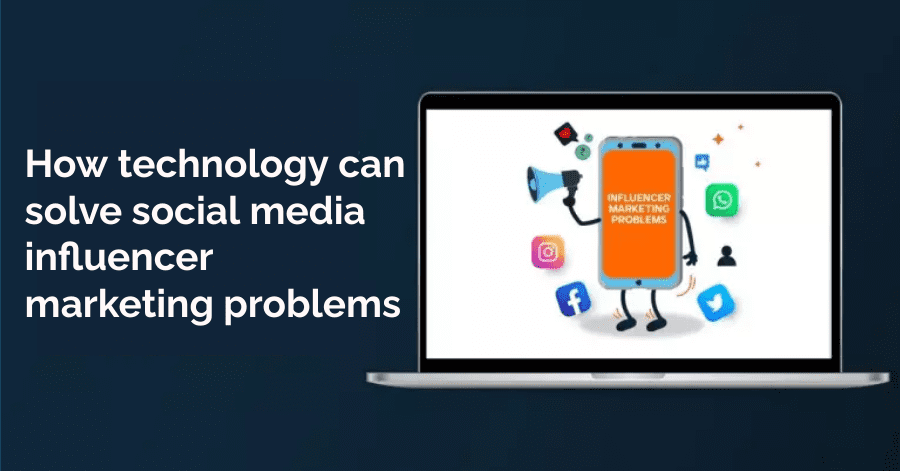Social media influencer marketing has become one of the most effective and popular methods for brands to promote their products and services. Influencer marketing is a powerful tool for businesses to reach their target audience and drive sales. However, like any other marketing strategy, influencer marketing also comes with its own set of challenges. One of the biggest problems faced by businesses in influencer marketing is the lack of transparency and accountability. Fortunately, technology can play a significant role in addressing these issues.
The Problem
Influencer marketing has become a multi-billion-dollar industry, but there is a lack of transparency in the way influencers disclose sponsored content. There have been instances where influencers have not disclosed that their posts are sponsored, leading to confusion among their followers. Additionally, the authenticity of influencers and their followers has also come under scrutiny. Fake followers and bots have become a major issue in influencer marketing, making it difficult for brands to measure the true impact of their campaigns.
How Technology Can Help
Technology can play a significant role in solving the problems faced by influencer marketing. Here are some of the ways technology can help:
- Influencer Identification:
One of the biggest challenges in influencer marketing is identifying the right influencers. With the help of technology, businesses can use data analytics to identify influencers based on their relevance, engagement rate, and other metrics. This can help businesses find the right influencers for their campaigns, ensuring maximum impact.
- Influencer Verification:
Another challenge in influencer marketing is the verification of influencers. With the rise of fake followers and bots, it has become difficult for brands to verify the authenticity of an influencer’s audience. However, technology can help in this regard. Platforms such as HypeAuditor and SocialBakers use AI algorithms to analyze an influencer’s audience and determine the percentage of fake followers. This can help brands identify the most authentic influencers for their campaigns.
- Transparency and Disclosure:
Technology can also help in promoting transparency and disclosure in influencer marketing. With the help of blockchain technology, brands can ensure that influencers disclose sponsored content. Blockchain technology can create a transparent ledger of all transactions, making it easy to verify whether an influencer has disclosed sponsored content or not.
- Performance Measurement:
Another challenge in influencer marketing is measuring the performance of a campaign. With the help of technology, businesses can track the impact of their campaigns and measure the ROI. Platforms such as Upfluence and TapInfluence offer real-time analytics that can help businesses track the performance of their campaigns and optimize them for maximum impact.
The use of technology in influencer marketing has already started to show promising results. Here are some stats that demonstrate the effectiveness of technology in influencer marketing:
- According to a study by Influencer Marketing Hub, the use of AI in influencer marketing can improve the accuracy of influencer identification by up to 50%.
- Another study by Influencer Marketing Hub found that businesses that use AI in influencer marketing can save up to 25% of their marketing budget.
- According to a survey by SocialPubli, 67% of marketers believe that blockchain technology can help promote transparency in influencer marketing.
- A study by Linqia found that influencer marketing campaigns that use real-time analytics can increase conversions by up to 30%.
Conclusion
Influencer marketing has become an integral part of the marketing mix for many businesses. However, the lack of transparency and accountability has made it difficult for brands to measure the true impact of their campaigns. Fortunately, technology can play a significant role in solving these problems. From influencer identification and verification to transparency and disclosure, technology can help businesses run more effective and efficient influencer marketing campaigns. As the influencer marketing industry continues to evolve, it is likely that technology will play an even bigger role in shaping its future. As more businesses embrace the use of technology in influencer marketing, we can expect to see more innovative solutions that address the challenges faced by the industry. We can also hope to see many analytics tools that will cater specifically to the influencer marketing community, and will help solve some of the biggest influencer marketing problems.
It is important to note that while technology can help solve many of the problems faced by influencer marketing, it is not a silver bullet. The human element is still crucial in influencer marketing, and businesses need to work with influencers who have a genuine connection with their audience. By combining the power of technology with human expertise, businesses can create effective and authentic influencer marketing campaigns that deliver real results.
In conclusion, technology has the potential to revolutionize the influencer marketing industry. From influencer identification and verification to transparency and performance measurement, technology can help businesses overcome the challenges faced by the industry. As the industry continues to evolve, it is important for businesses to stay abreast of the latest technological advancements and embrace innovation to stay ahead of the competition.

As the editor of the blog, She curate insightful content that sparks curiosity and fosters learning. With a passion for storytelling and a keen eye for detail, she strive to bring diverse perspectives and engaging narratives to readers, ensuring every piece informs, inspires, and enriches.










